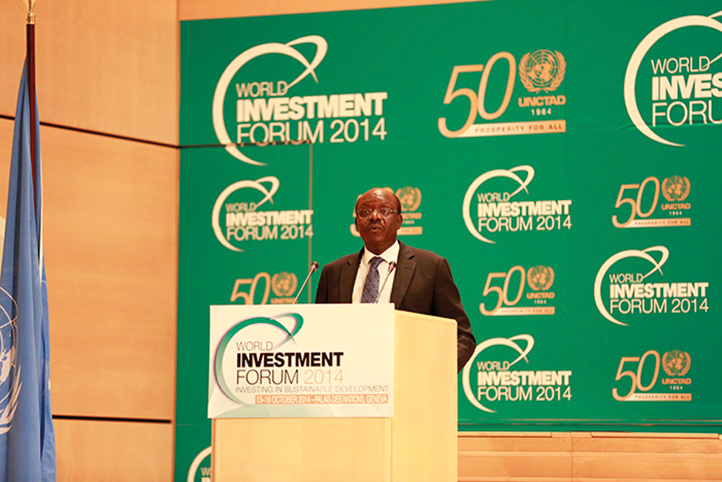By Henrietta Morris
In the early 1960s, developing countries began to raise concerns regarding their place in international trade, calling for a conference whose specific focus would be addressing these concerns. And thus the United Nations Conference on Trade and Development (UNCTAD) was born. Its mission, as stated in 1964, to create “a better and more effective system of international economic co-operation, whereby the division of the world into areas of poverty and plenty may be banished and prosperity achieved by all”.
The past decades have seen global development boom, particularly in urban areas. Yet, the ultimate aim that UNCTAD set out with all those years ago – prosperity for all – is still far from a reality. Global growth certainly shows no signs of slowing – indeed, the United Nations expects the world’s urban-dwelling population to rise from today’s 54% to a staggering 66% by 2050. That this growth must occur more sustainably and more inclusively has become an unavoidable fact – and one that all players in the global system must recognise.
The Millennium Development Goals (MDGs) set by world leaders in 2000 stated bold, and perhaps unrealistically broad, aims on which we have undoubtedly seen progress – urban slum populations and the number of those living in extreme poverty have fallen by more than a few percentage points since the turn of the millennium. However, few if any of the Goals are likely to have been achieved by their fast-approaching expiry date of 2015.
This context makes the discussion at October’s World Investment Forum, held in Geneva’s Palais des Nations – fittingly, the birth-city of the organisation, which this year celebrates it’s 50th anniversary – all the more timely and all the more pressing. As the international community turns its focus to the Sustainable Development Goals (SDGs) that will supersede the MDGs, sustainability, as the title of the new Goals suggests, is top of the agenda.
UNCTAD Secretary-General Mukhisa Kituyi, World Leaders’ Investment Summit II, Palais des Nations – 15th October, 2014
The SDG consultation process looks to be the most inclusive yet, with a cross-sectoral approach that not only moves away from the traditional model of developed world helping the developing, but also encompasses a broad sweep of actors on the global stage. The SDGs seek to galvanise action not just from governments, international organisations and non-governmental organisations (NGOs), but, crucially, from the private sector and other stakeholders worldwide.
With 3000 attendees, including high-level decision makers from government, business and civil society, this year’s World Investment Forum was no small fry event. Heads of State and Ministers, Parliamentarians, Presidents, and Princes (HRH The Prince of Wales for one), United Nations’ Directors and Multinational Corporation CEOs – there was certainly no shortage of big players, and this was reflected in the big questions brought to the table. Key global issues up for discussion included climate change; inequality in healthcare and education; and employment and gender rights.
The aims of the Forum were clear: to ignite a much-needed conversation on how multi-sector collaboration can be leveraged to support progress on, and ultimately the achievement of, the SDGs: to sketch out a “Roadmap” towards this more sustainable future. The discussion was underwritten by a weighty body of analysis from UNCTAD – chief among this the World Investment Report 2014, which outlines an Action Plan for mobilising private sector funding to support the SDGs. Because the reality is, the public sector does not have the means to finance its development ambitions alone. As the Report’s mid-point estimate suggests, with current rates of public sector and official development assistance (ODA) funding, the SDGs will face an annual investment shortfall of some $2.5 trillion.
The role that the private sector can play in supporting the Goals is, therefore, a vital one. It is also one that can take multiple guises. Sectors most obviously ripe for potential private-sector investment include infrastructure – within this, power and renewable energy – transport, water and sanitation. Yet actors in every sector have the power to influence the development process.
Academia has a role to play too, and leaders from universities and business schools worldwide were at the Forum to facilitate it. The four-day event saw the launch of UNCTAD’s new Business Schools for Impact initiative, designed to leverage business schools’ support for the SDGs. UNCTAD’s Director of Investment and Enterprise, James Zhan, made clear the importance of such support: “The role of business educators is fundamental to help equip a generation of entrepreneurs and managers to invest in communities where they can make a difference.” How UNCTAD envisages business schools will do this is by fostering in their business graduates both the mindset change and the skills they need to invest and operate in low-income countries and ensure they have a positive social impact.
At the end of the day, UNCTAD’s message was crystal clear: the SDGs are all about collaboration. United Nations Secretary-General, Ban Ki-moon, captured this most succinctly in his opening address to the Forum: “There is a strong business case for investing in sustainability. Private sector approaches can help us to innovate. At the same time, collaboration and partnership can ensure that investment in sustainable development is inclusive and aligned with national priorities.”
While the private sector needs to take on a new and more significant role in driving sustainable global development, international organisations, the public sector and ODA – the more traditional levers for investment in development – must equally remain central to the implementation of the SDGs, if they are to have any hope for success.
References
1. World Urbanization Prospects: 2014 Revision (highlights), Department of Economic and Social Affairs of the United Nations Secretariat, (United Nations: New York, 2014), p. 1
2. World Investment Report 2014: Investing in the SDGs – An Action Plan, UNCTAD, (United Nations: New York), p. 145. Available at: http://unctad.org/en/PublicationChapters/wir2014ch4_en.pdf
3. Ibid.


































































